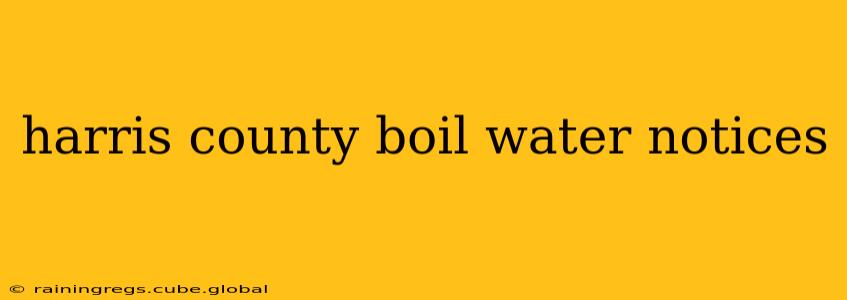Harris County, Texas, experiences boil water notices periodically due to various factors impacting water quality. These notices are crucial for public health, ensuring the water you use for drinking, cooking, and hygiene is safe. Understanding when and why these notices are issued, how to protect yourself, and where to find the most up-to-date information is vital for residents and visitors alike.
What Causes Boil Water Notices in Harris County?
Boil water notices are typically issued due to a loss of water pressure within the water distribution system. This pressure loss can occur for several reasons:
- Main breaks: Leaks or breaks in major water pipes can significantly reduce water pressure, increasing the risk of contamination.
- Planned maintenance: While less frequent, scheduled maintenance on water infrastructure can sometimes temporarily lower pressure.
- Extreme weather events: Severe storms, hurricanes, or floods can damage water pipes and lead to contamination.
- Contamination events: Although rare, contamination from sources like sewage overflow can necessitate a boil water notice.
The Harris County Public Health & Environmental Services department and individual water providers closely monitor the water system and issue notices when necessary to protect public health.
How Do I Know if There's a Boil Water Notice in My Area?
Several resources can keep you updated on boil water notices in Harris County:
- Your Water Provider: This is the most reliable source. Contact your specific water provider directly (e.g., City of Houston Public Works, individual municipal utilities) for real-time updates.
- Harris County Public Health & Environmental Services: Check their website and social media channels for official announcements.
- Local News Outlets: Many local news stations and websites provide timely updates on boil water notices.
- Automated Notification Systems: Sign up for your water provider's alert system to receive notifications directly to your phone or email.
What Should I Do During a Boil Water Notice?
When a boil water notice is issued, follow these critical steps:
- Boil Your Water: Bring water to a rolling boil for one minute before using it for drinking, cooking, brushing teeth, making ice, and preparing baby food.
- Avoid Using Contaminated Water: Refrain from using tap water for drinking, cooking, or any other purpose that could lead to ingestion until the notice is lifted.
- Disinfect Surfaces: Clean all surfaces that may have come into contact with unboiled tap water with a bleach solution (1 teaspoon of bleach per gallon of water).
- Check for Updates: Regularly check the resources mentioned above for updates on when the boil water notice is lifted.
How Long Do Boil Water Notices Typically Last?
The duration of a boil water notice depends on the nature and extent of the issue causing the water pressure loss. It can range from a few hours to several days. Water providers conduct testing to ensure the water is safe before lifting the notice.
What Happens After a Boil Water Notice is Lifted?
Once the water provider confirms the water is safe, they will issue a notice lifting the boil water advisory. It's still a good idea to flush your plumbing system by running cold water for a few minutes before resuming normal water usage.
Are There Certain Areas of Harris County More Prone to Boil Water Notices?
While boil water notices can affect any area within Harris County, older infrastructure in some areas may be more susceptible to main breaks and subsequent water pressure issues. However, every part of the county is potentially subject to notices due to factors like extreme weather.
What are the health risks of not following a boil water notice?
Failing to follow a boil water notice can lead to waterborne illnesses caused by bacteria, viruses, or parasites present in the contaminated water. These illnesses can range from mild gastrointestinal upset to more serious infections. Protecting yourself and your family's health is paramount.
By staying informed and following the guidelines during a boil water notice, you can significantly reduce the risk of illness and ensure the safety of your drinking water. Remember to always rely on official sources for accurate and up-to-date information.
